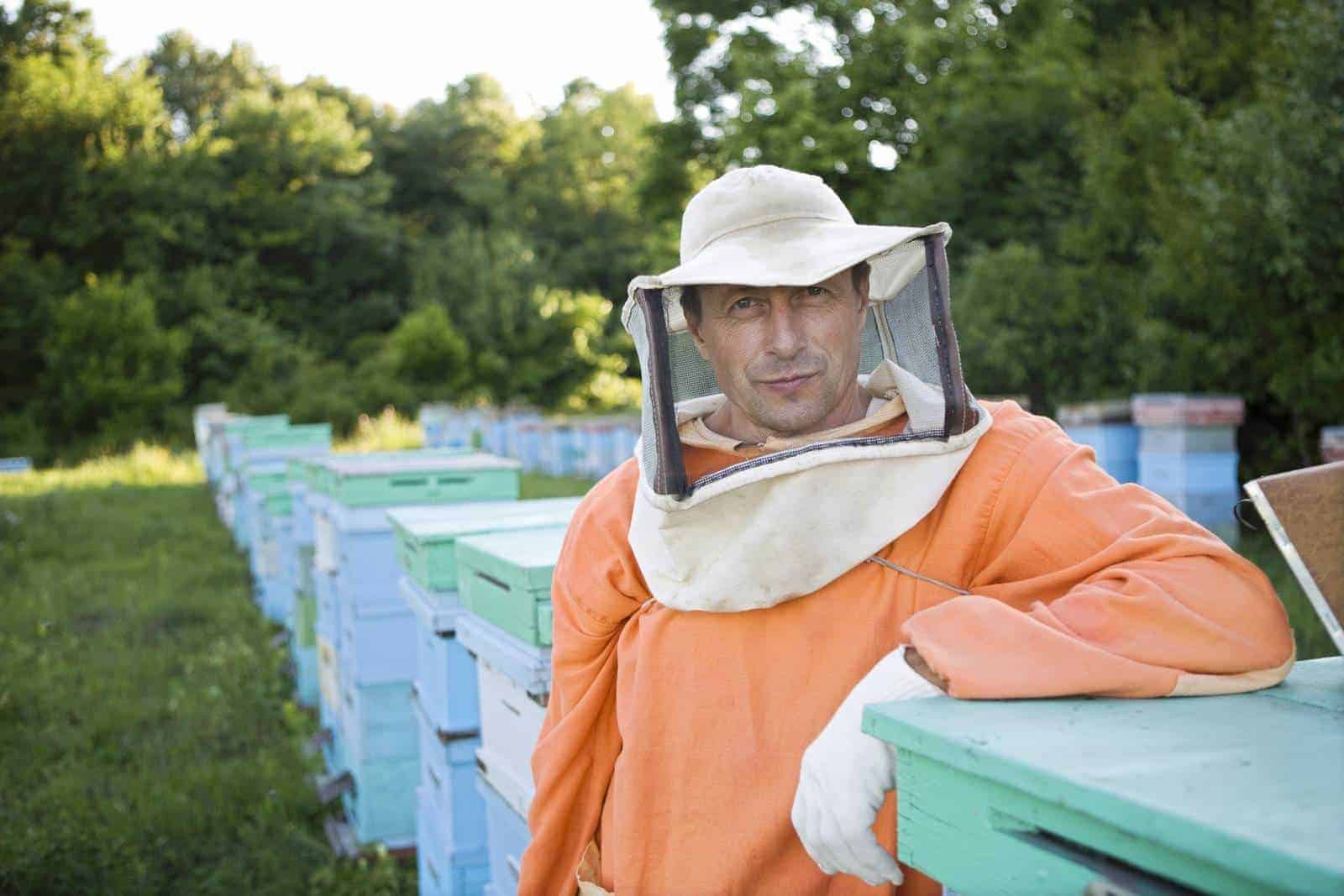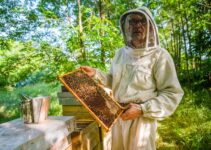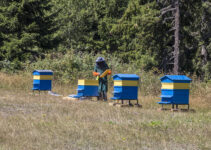One of the fastest-growing hobbies or even actual jobs in the world is beekeeping, as more and more people are beginning to understand how important bees are to the world and how fulfilling and lucrative beekeeping can be. In that regard, if you wanted to go into beekeeping, you might be wondering how much work you need to do. So, is beekeeping a lot of work?
Beekeeping is indeed a lot of work. For the more seasoned beekeepers, they tend to use about 40 hours a year for one hive alone. And you would need at least 300-500 hives to make a full-time living out of it. Meanwhile, beginners should add more hours to that number during the first year to learn more about beekeeping.
Beekeeping isn’t something as simple as actually buying the bees and simply allowing them to do their stuff. It takes more than just simple tending when it comes to how much care bees need. As such, you should know that you need to actually invest a good amount of time in beekeeping if you don’t want to end up wasting your investments.
How difficult is beekeeping?
Nowadays, more and more people are trying their hand at beekeeping because they actually find it a good hobby to have not only because they say that it can be fulfilling and relaxing, to some extent, but also because of how it can be quite lucrative and fun to do whenever you have some time to spare on the side.
Most of these people tend to work as beekeepers after their usual work hours or during their days off as they simply look at beekeeping as a hobby or as something that they can do to earn extra dollars on the side. Meanwhile, there are actually other people who may have taken beekeeping to the next level by turning it into their actual jobs, especially when there are plenty of hives to take care of.
While beekeeping might sound like something you would want to try, you might end up wondering how difficult it is. After all, beekeeping involves taking care of bees, which are usually seen as flying and buzzing stinging hazards that will end up hurting you if you are not careful 🙂 Nevertheless, it can still make one wonder if beekeeping is indeed something that is difficult for you to do.
So, yes, beekeeping can be something that is quite difficult to do because there are plenty of different things about it that may challenge you physically, emotionally, mentally, and, of course, financially.
Beekeeping can be physically difficult because, first things first, you have to consider the stings. Bees will sting, and that is something that you have to brace for both in the physical and emotional levels because of how you need to make sure that you are physically and emotionally ready to get stung by these flying needles. It would be rare for anyone to find a beekeeper that hasn’t been stung by bees even when they are wearing protective gear, and that is because bees will always sting you when they feel like you are a threat to their hive or colony. In that regard, this is a challenge that not all people are ready to face when it comes to beekeeping.
Another physical part of beekeeping is involved in handling your bee hives and supers, as you would need to be physically strong to be able to harvest honey. Honey supers can be heavy, especially if you have a heavy flow of honey from your beehives. Medium-sized supers can easily get as heavy as 50 pounds, which is something that not all people are capable of carrying by themselves. So, unless you are ready to take on the physical challenge of carrying heavy loads, beekeeping might not be for you.
Of course, beekeeping also involves having to stay out in the sun or in some place warm whilst wearing protective gear that can feel like a greenhouse at times. This can be pretty difficult for some people to do, especially if they are not used to staying out in the sun for prolonged periods of time. And if you sacrifice protection for better airflow when it comes to your protective gear, be ready to get stung by the bees.
On the mental side, beekeeping can be difficult because you have to actually prepare yourself mentally for the task of being a beekeeper. It’s not something that you suddenly learn in an instant because this is a hobby that you need to study and learn by reading, talking to expert beekeepers, and listening to different people who have already had some success in beekeeping. Moreover, you might even want to take up an experienced beekeeper’s offer to be a personal mentor if you want to succeed in this endeavor. And that is why beekeeping can be mentally taxing on any person.
Financially, beekeeping can be expensive at the start because you would need to shell out maybe a thousand dollars just to get things going. Your initial investment in beekeeping is the most expensive part of the endeavor, but you also have to consider that you will end up spending more money in the future to take care of your bees. As such, if you are not up to the challenge of spending money on beekeeping, this probably isn’t something that you should be doing.
So, all in all, beekeeping can be a difficult hobby or side job for anyone to do because of how it involves a lot of different challenges. But, then again, it wouldn’t be fun, exciting, and fulfilling without the challenges and difficulties. So long as you are up to the challenge, you might actually love beekeeping because it is something that is difficult for anyone to do.
How much work is beekeeping?
Aside from how difficult beekeeping can get, you might be wondering about the actual work that goes into it when you are already a beekeeper. So, how much work is beekeeping? And is the work that you need to do in beekeeping part of what makes it difficult?
Yes, beekeeping also involves a ton of work that can ultimately make it more difficult than it already is. While bees are great insects that are capable of taking care of themselves, your job here is to make sure that they are able to take care of the colony in the best way possible. And what you need to do on your part is to make sure that you provide the environment and the conditions that will allow your colony to thrive and stay healthy.
Spring is usually the busiest part of a beekeeper’s life because that is when the bees tend to become active once again after staying dormant throughout winter. As such, this is when you should be prepared to do the work needed to be done while also planning ahead for the upcoming seasons.
What you usually do during spring is to take the hives out of their winter configurations so that they can thrive in the warmth of the new season while collecting nectar from the nearby plants that are beginning to flower. You should also inspect the hives from time to time for about 20 minutes weekly to make sure that the queen and the rest of the colony are healthy. Always check for possible pests and natural predators that may be trying to take advantage of your colony.
Summer is also one of the peak periods for most beekeepers because bees usually stay active throughout the warm days of summer unless the sun is a bit too strong. During that time, make sure to check on your colony on a regular basis and make sure the queen is still healthy. You would most likely end up monitoring your hive throughout the summer.
When fall comes, this is when you should be prepared to harvest and process the honey from your hives. Remember that honey can be quite heavy and that you should also be at your best physically when it’s time to harvest. You should also spend the fall planning and preparing to winter-proof your hives.
Winter-proof your hives before the winter comes. Winter will be your rest period because your bees will stay dormant throughout that season. This is the only time you won’t be opening your hives at all as you would want to make sure that your hives are insulated properly while keeping out any cold air as much as possible. However, you can spend the winter preparing yourself for spring so that everything is in order once the snow starts to melt.
How much time does beekeeping take?
Most experts would say that beekeeping is something that would require at least 40 hours per hive from you on an annual basis. This already includes the usual stuff you need to do such as preparation, checking up on your bees, and harvesting honey from the hives. Of course, the more hives you have, the more hours you need to put into beekeeping. That is why those who have plenty of hives have already made beekeeping a full-time job, and not just simply a hobby or a side job.
However, if you are still a beginner beekeeper, the one thing you need to do is to spend maybe 10 to 20 more hours during your first year not because you need to do more work taking care of the bees but because you would need to use the extra time to learn more about beekeeping. You should spend a lot of hours reading books, watching beekeeping videos, learning from the experts, and spending time with a successful mentor. The first year is crucial for any beekeeper because that entire year is a learning process that will allow beginner beekeepers to get to know the ins and outs of beekeeping, and that is why it is important to spend as much time as possible during that first year.
But, if you look at it, working at least 40 hours a year doesn’t sound bad, right? Well, you have to look at it this way: one hive will never be enough for you to make a huge profit out of beekeeping. In fact, you would need dozens of hives if you want to really earn plenty of money from this hobby, as only a few hives won’t be enough to really make it a fulfilling side job for you money wise.
If you want to become a beekeeper on a full-time basis such as when you would want to make it your job, the only way for you to make a living out of it and earn enough money is to go for at least 300-500 hives. So, imagine working at least 40 hours a year on one hive alone times 500 hives. That can easily take up more than your entire year, and that is why you might want to hire some help if you want to keep make sure you can take care of that many hives.
Meanwhile, if you are looking to become a beekeeper on a solo basis while maintaining a full-time job, you could realistically manage up to 100 hives. That would take up about 4,000 hours on an annual basis, which sounds like it would be a lot of work.
So, in that regard, it becomes quite easy for you to understand that beekeeping does indeed require a lot of work from you, as you would need to work plenty of hours to maintain dozens or hundreds of hives. However, you probably don’t have to reach a hundred hives you are still a beginner and you are not looking to earn a lot from beekeeping.
Why Do You Want to be a Beekeeper?
Before you start any of this beekeeping business, make sure to think carefully about why you want to do all of this. Do you just want it as a sideline hobby and have no interest in making money? Do you just want enough honey for your family? Then of course a few hives will do the trick. Think about all of this carefully at the start and be aware of the working hours needed for each hive you commit to 🙂
Sources:
https://beehour.com/how-much-work-is-beekeeping/
https://www.keepingbackyardbees.com/11-considerations-before-becoming-beekeeper/
http://www.beeandbloom.com/blog/fabqs-how-much-work
https://www.perfectbee.com/learn-about-bees/about-beekeeping/is-beekeeping-right-for-you





